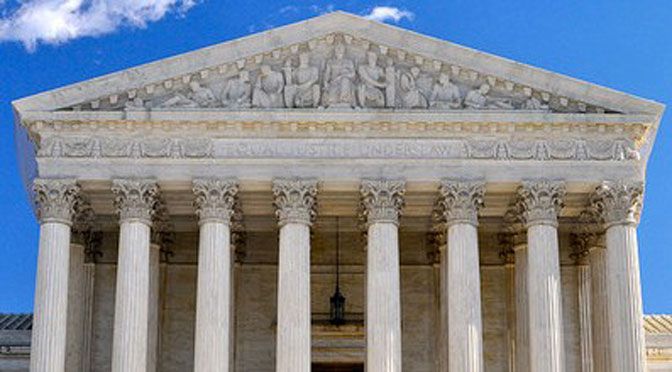In a disturbing development Friday, the Supreme Court issued an injunction against the enforcement of Louisiana’s admitting privilege requirement for abortion facilities—which could be a grim omen of things to come in the court’s upcoming ruling on Texas’s similar law. From the Columbia Tribune:
The high court’s order, with only Justice Clarence Thomas noting his dissent, came two days after the justices heard arguments in a major abortion case from Texas and just hours after they voted in a private meeting on the outcome of that case.
A vote for the clinics in Louisiana could signal that Justice Anthony Kennedy, whose vote is crucial to both sides, also will be a decisive fifth vote in favor of abortion clinics in Texas.
The cases are at different stages in the legal process, but they involve similar laws and actions by the same federal appeals court, the 5th U.S. Circuit Court of Appeals in New Orleans.
How significant is this really? On the one hand, while we know the decision was a majority vote, the fact that Thomas was the only one to note his dissent does not mean he was the only one to vote the right way, as justices can decline to disclose their votes on orders like this. Second, SCOTUSblog’s Lyle Denniston explains the impact of Louisana’s law is allegedly more urgent and significant than Texas’s:
The Louisiana situation is factually different from that in Texas, since doctors and clinics in Louisiana have argued that enforcement of the admitting privileges requirement would leave the state with a single clinic with only a single doctor, while the Texas law has been challenged on the basis of worry that it would leave eight or nine clinics throughout the state. Another difference is that the admitting privileges provision has been in effect across the state of Texas for months, but has been in force in Louisiana for only nine days.
Third and most significantly, it’s entirely possible this was more about procedure and/or asserting SCOTUS’s authority than the substance of the case… a point accidentally illustrated by ThinkProgress. There, Ian Millhiser notes that the order opens with a statement that the stay is “Consistent with the Court’s action granting a stay in Whole Woman’s Health v. Cole,” the previous stay it issued in the Texas case. Millhiser takes this as a “subtle spanking” of the Fifth Circuit for ignoring SCOTUS’s previous stay.
If this really was primarily about Anthony Kennedy’s displeasure at the Supremes being ignored, then it tells us virtually nothing about his view of the law. The good news is that this is entirely possible—irritation over the court’s prerogative being disrespected is relatively simple, whereas Kennedy’s abortion thinking is more nuanced—overall he’s pro-choice and pro-Roe, but he’s also open to limits such as parental notification and banning partial-birth abortion.
On the other hand, the fact remains that the case will be decided by a court lacking one of its most reliable pro-life minds, the late, great Antonin Scalia. The Louisiana law is less restrictive than the Texas one SCOTUS is reviewing (it also requires abortion facilities to meet additional surgical-center standards). And the ruling the Supremes just rebuked had more than impetuousness on its side—it was based on the abortion industry’s defenders and the lower court being wrong on numerous facts and making baseless predictions.
So in the end, we simply don’t know what this means for how the Supreme Court will rule. We do, however, still know how it should rule—firmly in favor of allowing states to require that the abortion industry meet standards that medical professionals widely recognizes as legitimate and necessary and that are fully permitted by the plain meaning of the Constitution’s text, and against a plaintiff that is only suing to evade accountability for its own documented medical misconduct.
The tragedy, of course, is that in this day and age, the merits of a case and the Supreme Court’s opinion all too often have nothing to do with one another.








